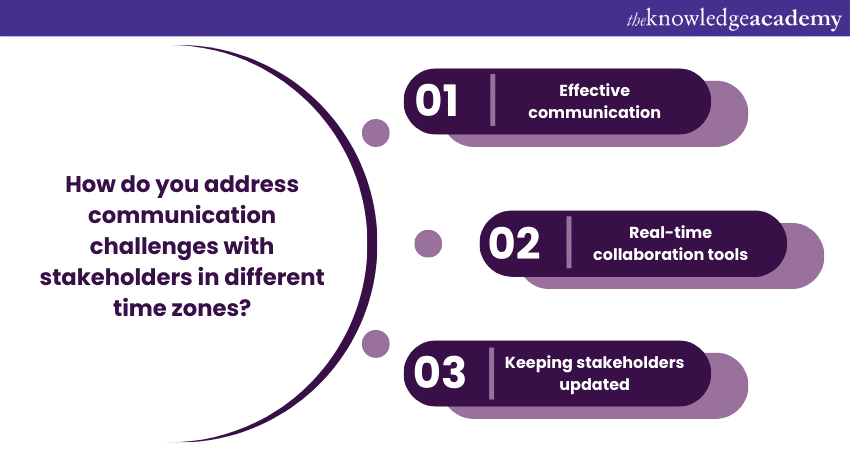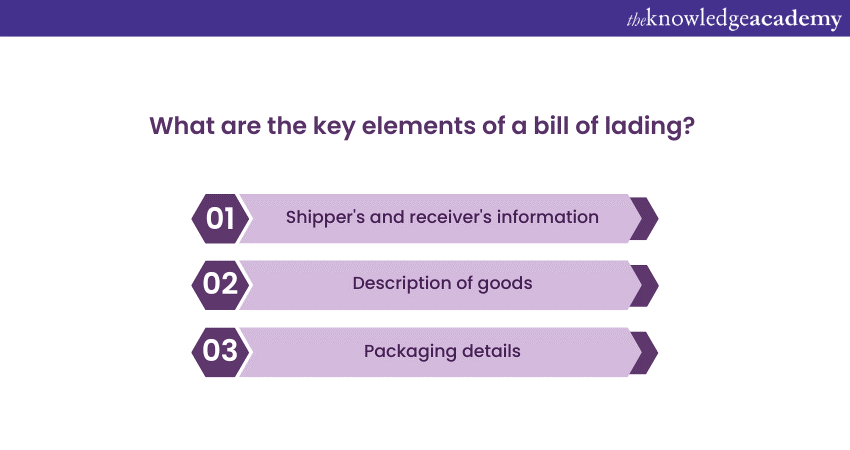We may not have the course you’re looking for. If you enquire or give us a call on 0800 446148 and speak to our training experts, we may still be able to help with your training requirements.
Training Outcomes Within Your Budget!
We ensure quality, budget-alignment, and timely delivery by our expert instructors.

In the fast-paced Logistics and supply chain management world, navigating complex processes, optimising operations, and ensuring seamless transportation is paramount. As individuals step into Logistics careers, the interview process is one of the deciding stages in their journey. We present a comprehensive blog to equip aspiring Logistics professionals with top 40 Logistics Interview Questions and Answers they need to succeed in interviews.
Table of Contents
1) Logistics Interview preparation
2) Common Logistics Interview Questions
3) Technical Logistics Interview Questions
4) Behavioural Logistics Interview Questions
5) Conclusion
Logistics Interview preparation
The key to excelling in a Logistics Interview lies in strategic preparation. As you gear up to face the panel of interviewers, a well-rounded approach is essential to showcase your knowledge, skills, and suitability for the role. Here's a comprehensive breakdown of how to prepare for a Logistics Interview:
a) Research the company and industry: Review the company's background, mission, values, and recent achievements. Gain insights into the company's Logistics industry position, significant clients, and competitors. This knowledge demonstrates your genuine interest and enables you to tailor your responses effectively.
b) Understand Logistics fundamentals: Review the fundamental Logistics and supply chain management concepts. Familiarise yourself with terms like transportation modes, inventory management, warehousing, and order fulfilment. This foundational knowledge will form the basis for your answers and discussions during the interview.
c) Review your resume: Expect questions about your resume and past experiences. Be prepared to elaborate on your roles, responsibilities, and accomplishments. Highlight instances where you demonstrated problem-solving skills, teamwork, and adaptability, showcasing your suitability for Logistics.
d) Behavioural competencies: Logistics isn't just about technical know-how; it also involves effective communication, leadership, and decision-making. Use the STAR (Situation, Task, Action, Result) method to structure your responses.
e) Technical know-how: Dive deeper into technical aspects like transportation management systems (TMS), enterprise resource planning (ERP), and warehouse management systems (WMS). Understand their functionalities and how they contribute to efficient Logistics operations.
f) Prepare for common questions: Anticipate and rehearse responses to commonly asked Logistics interview questions. These may include inquiries about your motivation for choosing Logistics as a career, your experience in supply chain management, how you handle challenges, and your familiarity with customs regulations.
g) Mock interviews: Engage in mock interviews with a friend or mentor. This practice helps you refine your responses, receive constructive feedback, and boost your confidence in articulating your thoughts concisely and effectively.
h) Develop your questions: Prepare thoughtful questions to ask the interviewers. Inquiring about the company's approach to sustainability, opportunities for career growth, or challenges the Logistics team faces showcase your enthusiasm and engagement.
Common Logistics Interview Questions
Navigating Logistics requires more than technical prowess; it demands a comprehensive understanding of supply chain dynamics, operational efficiency, and problem-solving. To help you prepare for your Logistics interview, let's dive into some frequently asked questions and provide sample answers to guide you:
Question 1) Tell me about yourself.
Answer: "Having completed a degree in supply chain management provided a strong foundation in Logistics. Gained hands-on experience in inventory management and transportation routing when working as an intern at XYZ Logistics. Also, utilising route optimisation resulted in reduced delivery times by 20%."
Question 2) What motivated you to pursue a career in Logistics?
Answer: "Logistics is intriguing since it's the heartbeat of commerce. The seamless movement of goods and information has a tangible impact on businesses and consumers. The challenge of coordinating intricate operations to ensure timely deliveries and cost efficiency is captivating. "
Question 3) Describe your experience with supply chain management.
Answer: "Managing end-to-end supply chains and collaborating with suppliers, manufacturers, and distributors has proved beneficial. The role involved demand forecasting, which optimised inventory levels and reduced carrying costs by 15%."
Keen to understand how logistics impact business workflow, refer to our blog on Importance of Logistics.
Question 4) How do you ensure efficient inventory management?
Answer: "Efficient inventory management requires balancing demand and supply. Employing techniques like ABC analysis to prioritise items, reducing stockouts and excess inventory. Reviewing historical data helps in adjusting reorder points, contributing to optimal inventory levels."
Question 5) Explain the importance of freight forwarding.
Answer: "Freight forwarding is the linchpin in international trade. It ensures that goods flow smoothly across borders, managing documentation, customs clearance, and transportation. It minimises delays, enhances visibility, and helps businesses expand their global reach."
Question 6) How do you handle transportation route optimisation?
Answer: "Route optimisation involves considering factors like distance, traffic, fuel costs, and delivery deadlines. Leveraging route planning software to generate optimal routes and monitor real-time data for adjustments has proven efficient. Doing so has reduced fuel consumption by 12% and improved on-time delivery rates."
Question 7) Discuss your familiarity with customs regulations.
Answer: "Navigating customs regulations is essential to prevent delays and fines. Staying updated on import/export laws, tariff codes, and documentation requirements. Successfully ensuring compliance, avoiding costly delays in cross-border shipments."
Question 8) Describe a time you successfully managed warehouse operations.
Answer: "Leading a warehouse team involves streamlining operations by implementing a new WMS. This reduced picking errors by 30% and improved inventory accuracy—additionally, reorganising storage layouts, optimising space utilisation and reducing travel time for staff."
Question 9) What software tools are you proficient in?
Answer: "Staying proficient in Logistics software, including TMS, WMS, and ERP systems, is essential. TMS is used to manage carrier relationships and track shipments and leverage WMS to improve order fulfilment accuracy. Familiarity with ERP systems enhances the ability to integrate Logistics data with other business functions."
Question 10) How do you manage risk in Logistics?
Answer: "Risk mitigation involves assessing vulnerabilities and developing contingency plans. For instance, diversifying the supplier base to reduce dependency risks and implementing safety stock to mitigate supply chain disruptions. Additionally, regularly monitoring geopolitical and economic factors that could impact Logistics operations."
Question 11) How do you stay current with industry trends and innovations?
Answer: "Staying abreast of industry trends is crucial. I regularly read industry publications, attend webinars, and participate in Logistics forums. For instance, I recently completed a course on blockchain's impact on supply chain transparency, which helps me adapt to evolving technologies."
Question 12) Can you explain the role of demand forecasting in Logistics?
Answer: "Demand forecasting predicts future customer demand, enabling optimised inventory levels and production plans. By analysing historical data and market trends, I've enhanced accuracy and reduced excess inventory costs by aligning supply with actual demand."
Question 13) How do you address communication challenges with stakeholders in different time zones?

Answer: "Effective communication is pivotal in global Logistics. I ensure open channels through regular virtual meetings and clear documentation. By leveraging technology, we use real-time collaboration tools and maintain a shared project dashboard, ensuring all stakeholders are on the same page."
Question 14) Describe a situation where you managed a high-pressure Logistics crisis effectively.
Answer: "During a dockworkers' strike, shipments were at a standstill. I orchestrated a temporary rerouting plan to alternative ports, ensuring minimal disruption to customer orders. By communicating proactively and collaborating with carriers, we managed to keep deliveries on track."
Question 15) How do you prioritise tasks when facing tight deadlines and resource constraints?
Answer: "When resources are limited, I focus on critical tasks by employing the Eisenhower Matrix. This method ensures that high-priority tasks are addressed while optimising resource allocation."
Get trained on the most up to date technology, sign up for our Industry Training now!
Technical Logistics Interview Questions
Technical understanding is the backbone of a successful Logistics career. As Logistics operations become more intricate, professionals with a solid grasp of industry-specific concepts are in high demand. To help you tackle the technical aspects of your Logistics interview, here are some common questions along with sample answers:
Question 16) What is just-in-time (JIT) inventory management?
Answer: "Just-in-time inventory management is a strategy to minimise inventory levels by receiving goods only as needed for production or distribution. This approach reduces storage costs and waste while ensuring timely availability. I've implemented JIT in my previous role, resulting in decreased carrying costs and improved cash flow."
Question 17) Explain the difference between LTL and FTL shipping.
Answer: "LTL stands for Less-Than-Truckload, where shipments occupy a portion of a truck. It's cost-effective for smaller shipments but might take longer due to multiple stops. FTL, or Full-Truckload, involves a single shipment occupying an entire truck. While FTL is faster, it's more suitable for larger shipments. Selecting the right method depends on factors like shipment size, budget, and time constraints."
Question 18) Discuss the role of EDI in Logistics.
Answer: "Electronic Data Interchange (EDI) facilitates seamless data exchange between trading partners. It streamlines order processing, shipment tracking, and invoicing. For instance, I've automated order confirmations using EDI, reducing manual errors and expediting order fulfilment. EDI enhances accuracy and accelerates communication in the supply chain."
Question 19) What is cross-docking, and how does it work?
Answer: "Cross-docking is a Logistics strategy where incoming goods are transferred directly from inbound to outbound trucks with minimal or no storage. It's efficient for fast-moving goods and reduces warehousing costs. I've overseen cross-docking operations, ensuring accurate sorting and timely transfers to optimise delivery times."
Question 20) Define incoterms and their significance.
Answer: "Incoterms are international trade terms that define responsibilities and risks between buyers and sellers during shipping. They outline key aspects like transportation costs, insurance, and customs duties. Understanding Incoterms is vital for clear communication and preventing disputes. For instance, using the 'FOB' Incoterm, I've clarified that ownership transfers when goods are loaded onto the vessel, ensuring a smooth handover."
Question 21) Describe the process of reverse Logistics.
Answer: "Reverse Logistics involves handling returned or defective products. It encompasses tasks like returns processing, refurbishing, recycling, or disposal. In my previous role, I implemented a reverse Logistics system that reduced returns processing time by 20% through automated tracking and efficient disposition."
Question 22) What are the key elements of a bill of lading?

Answer: "A Bill of Lading (BOL) is a legal document that consists of shipment details. It includes the shipper's and receiver's information, description of goods, packaging details, and shipping terms. I've used BOLs extensively to ensure accurate documentation, smooth cargo acceptance, and regulatory compliance."
Question 23) Explain the concept of intermodal transportation.
Answer: "Intermodal transportation involves using multiple modes of transport within a single journey, often combining trucks, trains, ships, and planes. This approach minimises transit time, optimises costs, and reduces carbon footprint. I've orchestrated intermodal solutions, leveraging rail and trucking networks to enhance efficiency and cut transportation expenses."
Question 24) How does blockchain impact supply chain visibility?
Answer: "Blockchain technology ensures transparency and security in supply chains. It creates an immutable record of transactions, enhancing traceability and reducing fraud. For instance, I've used blockchain to track the origin of goods and ensure authenticity, bolstering consumer trust and streamlining compliance."
Question 25) Discuss the challenges of last-mile delivery.
Answer: "Last-mile delivery, the final leg of a product's journey to the customer, faces challenges like congestion, time windows, and customer preferences. To address this, I've employed route optimisation software and experimented with alternative delivery methods like drones, enhancing on-time deliveries and customer satisfaction."
Question 26) How do you optimise the warehousing layout for efficient operations?
Answer: "Optimising warehousing layout involves strategically placing items for easy access and minimising travel time. I've employed techniques like ABC analysis to group products by demand. Additionally, I've reorganised layouts based on SKU velocity, reducing picking time and boosting overall efficiency."
Question 27) What are safety data sheets (SDS) and their relevance in Logistics?
Answer: "Safety Data Sheets (SDS) provide crucial information about hazardous materials, including handling, storage, and emergency response measures. In Logistics, SDS are essential for the safe transportation and storage of dangerous goods. I've ensured compliance by thoroughly reviewing SDS and training staff on proper handling protocols."
Question 28) How does just-in-case inventory management differ from just-in-time?
Answer: "Just-In-Case inventory management involves holding surplus inventory as a buffer against uncertainties like demand fluctuations or supply disruptions. In contrast to Just-In-Time, which aims for minimal inventory, Just-In-Case ensures supply continuity but can result in higher storage costs. I've balanced both approaches based on specific product characteristics and market conditions."
Question 29) Can you explain the impact of E-commerce on Logistics?
Answer: "E-commerce has revolutionised Logistics by demanding faster deliveries and personalised experiences. I've adapted by implementing order aggregation techniques to optimise shipping costs and collaborating with e-commerce platforms to integrate real-time tracking, ensuring customers have visibility into their orders."
Question 30) Describe a situation where you successfully negotiated freight rates.
Answer: "In a recent negotiation, I leveraged our shipping volume to secure more favourable rates from carriers. By demonstrating our long-term partnership potential and emphasising the mutual benefits, I achieved a 15% reduction in freight costs. This enabled us to offer competitive pricing to customers while maintaining healthy profit margins."
Understand how to implement inventory planning and management for an efficient Supply Chain, sign up for our Supply Chain Management Training now!
Behavioural Logistics Interview Questions
Behavioural questions provide interviewers with insights into how you handle real-world situations and challenges. Demonstrating your behavioural competencies and problem-solving skills is essential in portraying yourself as a well-rounded Logistics professional. Here are some common behavioural Logistics interview questions, along with sample answers:
Question 31) Describe a time you resolved a critical shipping issue.
Answer: "During a peak season, a shipping carrier strike threatened timely deliveries. To mitigate the impact, I quickly researched alternative carriers and negotiated contracts. By rerouting shipments and maintaining constant communication with affected customers, we minimised delays and maintained customer satisfaction."
Question 32) How do you handle communication with stakeholders?
Answer: "Effective communication is paramount in Logistics. I ensure regular updates through various channels—email, phone calls, and even periodic face-to-face meetings. For instance, during a supply chain disruption, I initiated a conference call with internal teams, suppliers, and customers to address concerns, leading to collaborative problem-solving."
Question 33) Discuss a challenging decision you made to ensure timely deliveries.
Answer: "Facing unexpected weather disruptions, I had to decide whether to delay shipments or reroute them. Analysing weather patterns and consulting with carriers, I chose to reroute, ensuring on-time deliveries. Though the decision involved additional costs, it prevented service disruptions and maintained customer trust."
Question 34) Share an example of negotiating shipping rates successfully.
Answer: "In a cost-cutting initiative, I renegotiated rates with carriers. Armed with data on our shipping volume and market benchmarks, I entered negotiations well-prepared. I emphasised our consistent business and the potential for future growth, securing a 10% reduction in shipping costs."
Question 35) Describe a time you improved warehouse safety protocols.
Answer: "Recognising safety gaps in our warehouse, I implemented a comprehensive safety training program. I organised workshops, introduced new safety equipment, and established regular safety audits. This reduced workplace accidents by 25% and boosted employee morale, fostering a safer work environment."
Question 36) How do you prioritise tasks during peak shipping seasons?
Answer: "During peak seasons, prioritisation is crucial. I employ a combination of urgency and impact. High-priority tasks affecting customer deliveries receive immediate attention, while less time-sensitive tasks are strategically scheduled. By organising a task hierarchy, I ensure smooth operations despite increased workload."
Question 37) Explain a time you collaborated with other departments for Logistics efficiency.
Answer: "To enhance inventory accuracy, I collaborated with the IT department to implement a barcode scanning system. We jointly developed a system that integrated with our WMS, reducing manual errors and improving order fulfilment speed by 30%."
Question 38) Share a situation where you managed a supply chain disruption.
Answer: "During a supplier delay, I implemented a backup sourcing strategy to prevent production halts. I communicated with the production team and quickly sourced materials from an alternate supplier, ensuring uninterrupted production and timely deliveries."
Question 39) Discuss how you maintain compliance with environmental regulations.
Answer: "Environmental compliance is a priority in Logistics. I've overseen proper disposal of hazardous materials, coordinated with carriers using eco-friendly transportation modes, and implemented recycling programs. By staying informed about evolving regulations, I've ensured our operations align with sustainability goals."
Question 40) Describe a time you led a team through a complex Logistics project.
Answer: "When implementing a new WMS, I led a cross-functional team through every stage. I delegated tasks, set milestones, and encouraged open communication. By fostering collaboration and maintaining a clear project timeline, we successfully launched the system on time, improving order accuracy by 20%."
Learn product design for environmental and sustainable logistics, sign up for our Logistics Management Training now!
Conclusion
Mastering the intricacies of Logistics is a journey paved with knowledge and expertise. The insights gained from these "40 Logistics Interview Questions and Answers" offer a solid foundation for excelling in interviews and succeeding in a dynamic field. Embrace this knowledge as you pursue your path to becoming a Logistics leader.
Learn the importance of export controls for academic researchers, sign up for our Export And Trade Compliance Training now!
Frequently Asked Questions
Upcoming Business Skills Resources Batches & Dates
Date
 Logistics Management Training
Logistics Management Training
Fri 24th Jan 2025
Fri 21st Mar 2025
Fri 2nd May 2025
Fri 29th Aug 2025
Fri 3rd Oct 2025
Fri 5th Dec 2025







 Top Rated Course
Top Rated Course



 If you wish to make any changes to your course, please
If you wish to make any changes to your course, please


